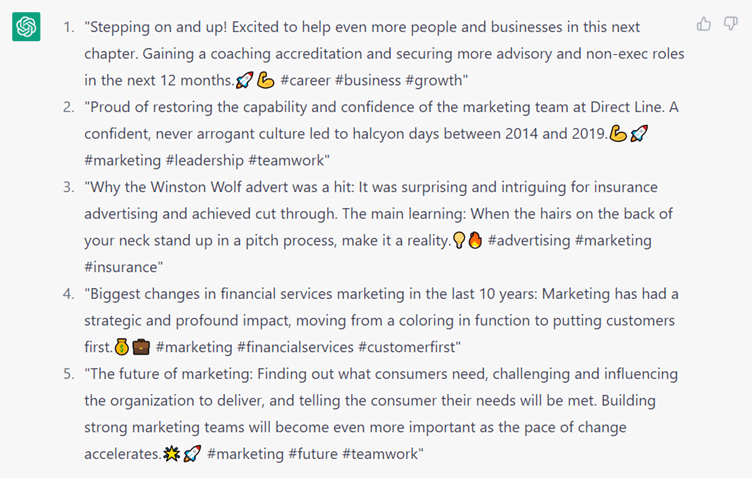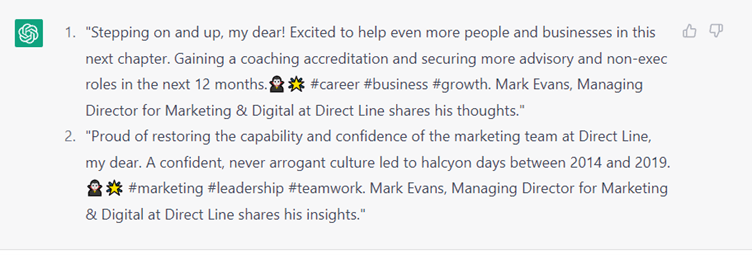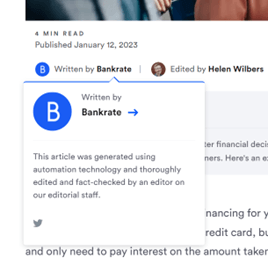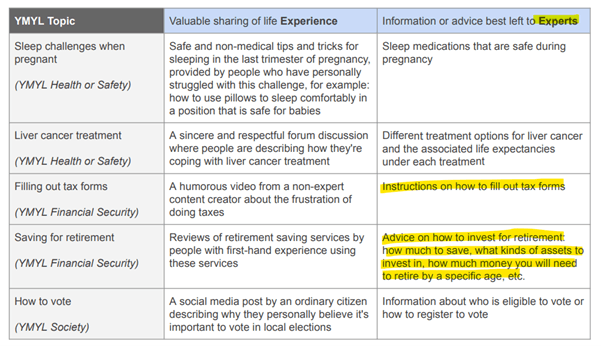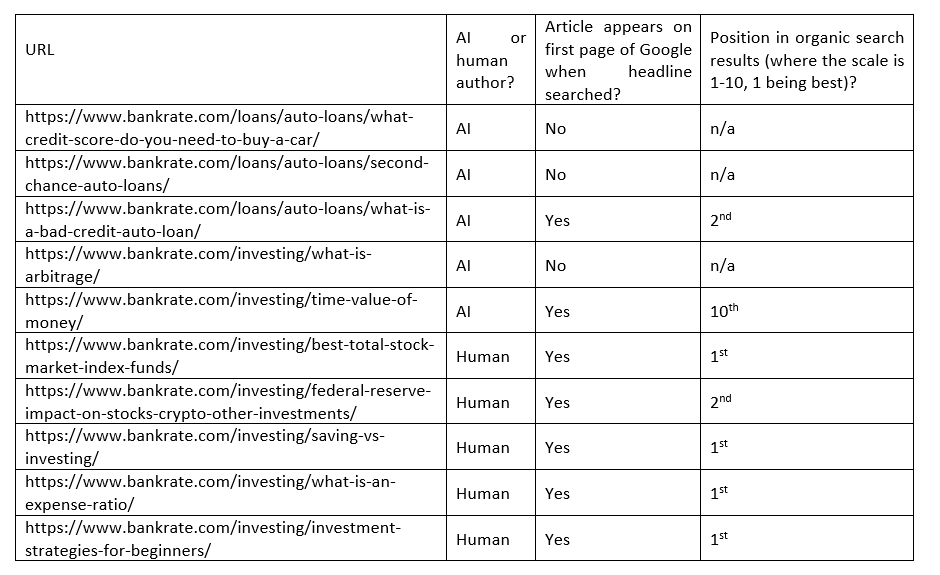Luke Budka, Director of PR, Content and SEO at Definition, explores whether ChatGPT is going to replace content creators – and what Google might have to say about it.
You can’t move for ChatGPT stories at the moment. But just in case you’re not in that particular bubble, ChatGPT is an AI tool that can answer questions, perform tasks, create content and importantly, iterate on its outputs.
For example, if I take the content from this FS Forum interview with Mark Evans, Managing Director for Marketing & Digital at Direct Line, published in January, and copy it into ChatGPT, I can then ask the AI to do whatever with it. Maybe turn it into five promotional posts for LinkedIn including emojis:
Hmmm, I didn’t ask it to include hashtags.
And it hasn’t specified who the interviewee is.
Please change the posts so it’s clear the interviewee was Mark Evans:
And then rewrite the first two posts supposing Mark Evans spoke like Dracula:
Note the tyrannical intonation. I didn’t ask it to change the emojis either.
You get the point. It’s not perfect, but it almost is.
So, this is the future of content creation right?
Wrong. Kind of.
Publishers have been using AI content generators for a while – this blew up on Twitter recently when it was pointed out to Google SearchLiaison (the official go-between Google and the marketing world aka Danny Sullivan) on Twitter that Bankrate, a leading personal finance site, was happily publishing lots of AI generated stories.
Bankrate points out in its byline on said stories, that while the articles may have been generated by AI, they’re curated and reviewed by a human being: an expert editor with relevant experience. This is super important and ties in really closely with Google’s EEAT update released late December, in which the search engine giant added a new ‘E’ to its guidance for marketers and website owners, on how to produce high quality content. The ‘E’ stands for experience and is an obvious way for Google to combat AI generated copy.
There is confusion though. Google clearly says in its spam guidelines that ‘text translated by an automated tool without human review or curation before publishing is bad’ and that ‘text generated through automated processes without regard for quality or user experience’ is equally frowned upon. In addition, Google’s Search Advocate John Mueller has been super clear in the past that content automatically generated with AI writing tools is considered spam. And Google launched multiple ‘helpful content’ algorithm updates in the second half of last year to promote quality, original content, written by humans.
Google wants quality, trustworthy, original content, written by bonafide experts, for its index, because this is what users want.
Google especially wants this if you fall into the Your Money Your Life (YMYL) category. Basically finance and health websites.
In its guidelines it says, ‘informational pages on clear YMYL topics must be accurate to prevent harm to people and society’.
It reiterated this in its recent EEAT update blog: if you’re looking for information on how to correctly fill out your tax return, you want to see content produced by an expert in the field of accounting – not an AI.
So financial companies need to sit up and take note.
At the moment Bankrate uses ‘experience’ and human author association to get around the fact it’s using AI to generate content. It’s claiming content is fact checked by a human editor and then naming and linking to said editor.
But is this content performing? Does Google consider the content worthy of inclusion in its index for example?
This is not a straightforward question to answer. But we can make educated guesses based on the title (the H1) and the title link of each Bankrate article.
Accordingly, we did some ‘back of fag packet’ analysis and searched for the headers of five articles on Bankrate (published in January) that were written by its AI tool (and then ‘moderated’) and five that were written by humans:
Dr. Pete Myers, marketing scientist at SEO software company Moz, recently speculated: “Unfortunately, the biggest short-term threat to Google is that people and companies will likely use ChatGPT to churn out mountains of low-quality content, costing Google time and money and likely resulting in major, reactive algorithm updates. This will also be a serious headache for search marketers, who will have to react to those updates.”
Does this Bankrate research suggest this is already happening? Are algorithmic penalties being applied? If I’m Bankrate then I’m closely following the organic performance of my AI articles.
Interestingly there’s a suspicion another financial publisher, that was recently outed for churning out huge quantities of AI content, has already done this and made a quick decision to stop using AI for content production.
Earlier this month, Futurism broke the news that CNET (specifically CNET Money) had been publishing articles written by AI. Futurism followed up on this piece with a closer examination of an article on compound interest. It contained loads of errors. Obviously a massive issue for Google as it’s particularly hot on finance content. Roll on Jan 25th and CNET editor-in-chief Connie Guglielmo published a statement in which she admitted the AI has made a lot of mistakes and they’ve paused usage of it.
Google News
But for the financial sector, it’s not just about avoiding Google’s wrath. It’s about using EEAT to its advantage. We (and the national media) spotted this as far back as October 2021.
The Evening Standard’s finance editor noticed Hargreaves Lansdown was outranking traditional news publishers in Google News. Google News is the fifth largest publisher of news in the world, attracting ~450m visits a month.
When the Evening Standard’s finance editor went looking for what had already been written regards Tesco results, he was greeted with an article from Hargreaves Lansdown in Google News. It outranked The Times’ commentary and other national newspapers.
According to Google’s EEAT principles, this makes sense.
When rating ‘page quality’ (PQ) it advises its quality raters (the human beings that help it to assess the quality of results in its A/B search engine tests) to assess:
Experience – the content creator’s first-hand experience of what it is they’re writing about
Expertise – the content creator’s knowledge of the topic
Authority – whether or not the content creator or the website is known as a go-to source for the topic
By nailing these PQ factors and publishing timely analysis, Hargreaves Lansdown was able to outrank national newspapers and be the source for millions of Google News readers.
Imagine how powerful a channel your owned media becomes if you can do this? All of that top of funnel traffic that could be generated and nurtured; all of the associated creditably and awareness raising that ranking in Google News generates.
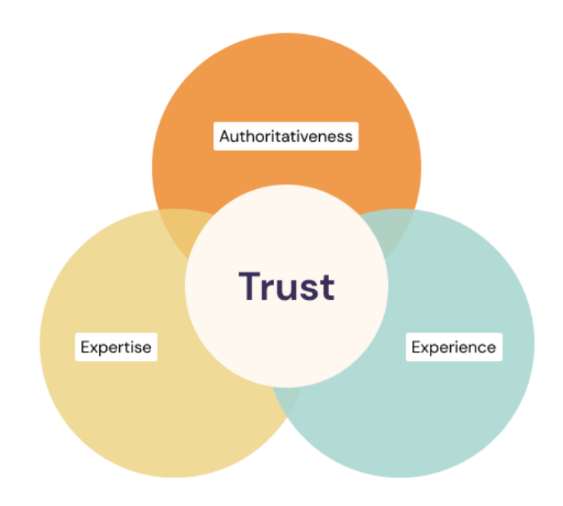 So how to mimic Hargreaves Lansdown’s success?
So how to mimic Hargreaves Lansdown’s success?
The good news is, the barrier for entry for Google News inclusion has never been lower. In short, if you’re producing timely content in an obvious news format, authored by experts, you’re eligible.
However, specific focuses are sensible.
Your website’s ‘Team’ pages – Google advises companies to survey their customers regards the experts these customers expect to see associated with the company. Are your crack teams of analysts, economists and market watchers front and centre for all to see? Are you a personal finance brand? In which case, who’s your Martin Lewis? Are you an FX trader? In which case who’s featured most in the press talking about currency movement? Do you need to hire ‘thought leaders’ to fulfil this piece and represent your brand?
Your author profiles – Google advises thought leaders to conduct ‘reconciliation’. This means directing all expertise signals towards a single ‘profile’. Are your thought leaders doing this? Is it a page on your website? Is it a certain social profile? If it’s a LinkedIn profile (and LinkedIn is fantastic for reconciliation) then have all your content authors made it clear on their LinkedIn profiles what their job titles are and that they represent your brand?
Your structured data – an easy way to indicate authorship is to add bylines to content and link to the author’s social profile in the byline. However, if you want to nail the experience piece and ensure you have the best chance of appearing in Google News at the same time, then you need to add ‘Article’ structured data to your content (structured data is not strictly required to be eligible for Google News but it does make it super clear to Google that you are producing content to be considered for inclusion). ‘Article’ structured data includes author name properties as well as ‘SameAs’ and ‘author.url’ properties where you can include the author’s social profile URL to nail the reconciliation piece.
Robot writers
Will ChatGPT produce quality, original, accurate content? No. It’s not designed to. Is it capable of producing error free content? No, not 100% of the time. This has been proven by CNET’s experiments. It’s been trained on a dataset of text called the “WebText” dataset which includes A LOT of unverified information like forum posts, personal blogs and Wikipedia pages. Its accuracy is extremely questionable and by its very nature it has no ‘experience’. This doesn’t mean it cannot be part of the financial sector’s content production process, and new versions will be even better ‘assistants’ to content creators, but it should be used as a research tool, not a substitute for human authors with high levels of EEAT.
Some sites will use it as the sole source of content for their sites, but as Mueller pointed out back in April last year, and as our provisional Bankrate research may already be showing, Google will catch up and order and promote the content in its index appropriately.

